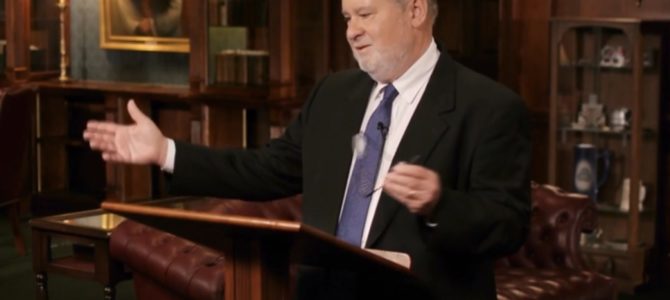America’s lack of civic and cultural knowledge is an existential threat, says Hillsdale College President Larry Arnn in his introductory lecture to the college’s free online lecture series, “History 101: Western Heritage.”
“We’re living in a time as if some blight has come across the earth,” Arnn says. “Something fantastic, something deep, something old, something elevated, something high is basically being obliterated.”
He points to the constant litany of public surveys stretching back decades that keep showing large percentages of Americans cannot say when Abraham Lincoln lived, who Joseph Stalin was, or what century the Civil War took place. Pointing this out has become a sort of cottage industry of reoccurring bestsellers such as E.D. Hirsch’s 1984 “Cultural Literacy,” Neil Postman’s 1985 “Amusing Ourselves to Death,” and Allan Bloom’s 1987 “Closing of the American Mind.” Despite constant re-acknowledgement of this phenomenon, however, it not only persists but has worsened.
While the oldest data is not as plentiful as today’s, sociological surveys such as Alexis de Tocqueville’s 1837 “Democracy in America” and Hirsch’s careful documentation of available evidence for the twentieth century, as well as other surveys of original material, all indicate a marked decline in public knowledge since the founding era. Arnn argues that this decline directly reduces Americans’ ability to fulfill our duties as citizens to govern ourselves.
He says a “virus has come among us,” a virus in the form of the idea that “the things in the past have been superseded, they’re not valuable, they’re obsolete.” While this may be true of some things, particularly technological advancements, he says this is not true of many things, particularly truths about human nature that over time Western culture has uncovered and handed down.
Understanding human nature is key to being self-governing citizens, Arnn says, because if you don’t know how people work you will not understand how to effectively address the myriad problems we all encounter individually and corporately. Thus, ignorance of one’s intellectual tradition leads to cultural chaos. He gives examples of this cultural chaos, including the refusal of high school and college teachers to tell students what constitutes good literature and why, instead telling students there is no way of knowing.
You can sign up for Arnn’s lecture here for free. In the accompanying Q&A, Arnn also addresses questions such as the importance and practicability of studying Eastern history, whether studying the West’s history is “cultural imperialism” or “racist,” and how a revival of cultural knowledge can help address the political problems the United States faces — namely our impending welfare-state-fueled debt apocalypse.
“There needs to be a revival of learning,” he says in the Q&A with Hillsdale journalism professor John Miller, a National Review contributor. “We are in the midst of great movements in America. There’s a crisis, and what that means is, soon enough, not necessarily this year but soon enough, we’re going to have to pick how we govern ourselves. Because we’re sort of doing it both ways now and we’re running out of money… That choice, however can only be well-made by somebody who has a thorough understanding of the two alternatives, either this progressive-bureaucratic form or the constitutional form that has governed America for most of its history.”
For several generations now, he says, this broad and deep knowledge that is key to America’s survival as a singular nation that preserves citizens’ natural liberties has been eroded. Western civilization’s centuries of dialogue between Athens and Jerusalem — two historic cities that represent reason and faith, respectively — establish universals about human nature that Americans once again need to draw upon to make key decisions about our future. This is why the college has put this lecture series, and many others, online.
“There’s a truth to by found by reason for every human being and a truth to be found by faith for every human being,” Arnn says. “…There are things to know that are lovely and ennobling to know.”
I’m a Hillsdale graduate and thus took its Western Heritage class in person some years ago as a freshman. I’ll be revisiting it through these lectures and writing about it as I go. They’re downloadable as audio files, the easiest way for me to listen as a working mom of five. Join me, both through this written series and the Hillsdale materials. If Dr. Arnn is right, doing so is one way to fulfill our civic duty to a country that has given us much and needs us much in return. Let’s test that proposition together.









